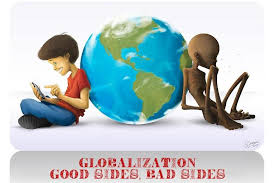Globalisation is a term tossed around society on an extremely frequent basis, I personally have come into contact with it on numerous occasions. However I have never fully understood the complexity of the concept and its vast presence in our lives until this week. “Globalisation refers to an international community influenced by technological development and economic, political and military interests. It is characterised by a worldwide increase in interdependence, interactivity, interconnectedness, and the virtually instantaneous exchange of information” (O’Shaughnessy and Stadler, 2008) With the presence of globalisation becoming stronger in our everyday lives it has inevitably lead to the presence of new concepts encompassed by it; the global village, cultural imperialism, imagined communities and Utopian and dystopian views are all concepts that have opened up a whole new world of insights for me this week.
The notion of the “Global village” (O’Shaughnessy and Stadler, 2008), a concept imagined by Martin McLuhan, ties in with the ideals of a Utopian vision of globalisation. This ideal presents a harmonious interconnected world rid of inequality, hierarchy and cultural imperialism. While this kind of world certainly sounds appealing, I feel cultural imperialism is unavoidable. In all relationships there is a chain of command, most friendships possess a dominant individual who takes control organises the times and places for hanging out. It is in human nature for some people to take control and obtain more power than others, this is present right across the Globe as we can see through concepts such as Americanisation.
Source: https://www.google.com/search?site=&tbm=isch&source=hp&biw=1280&bih=683&q=globalisation&oq=globalisation&gs_l=img.12..0l10.1152.3341.0.4620.13.11.0.0.0.0.524.2061.2-3j2j0j1.6.0….0…1ac.1.64.img..7.6.2044.7nvm2jtcFds#imgrc=ixD0f0Vf5FLfYM%3A
Benedict Anderson’s concept of the imagined community particularly stuck my interest as it instantly made me consider the limitations we encounter when creating imagined communities among different social groups globally. An imagined community “is imagined as a community, because, regardless of the actual inequality and exploitation that may prevail in each, the nation is always conceived as a deep, horizontal comradeship.” (O’Shaughnessy and Stadler, 2008) Something other than face to face interaction binds this community together and creates a sense of partnership between the participants. However how is it possible for every human on the globe to have the same opportunities and resources to join imagined communities? How is it possible to achieve a utopian ‘Global village” when the formation of this village would require the use of technologies and resources only made available to some? Of course social media comes to mind when analysing the impact of technology and the growth of globalisation, however how are we to expect members of an African tribe to sign up to Facebook for example. There is no way utopianism and equality can be achieved on a global scale when equality cannot be found in other ways, such as an economic level.
Source: https://www.google.com/search?site=&tbm=isch&source=hp&biw=1280&bih=683&q=globalisation&oq=globalisation&gs_l=img.12..0l10.1152.3341.0.4620.13.11.0.0.0.0.524.2061.2-3j2j0j1.6.0….0…1ac.1.64.img..7.6.2044.7nvm2jtcFds#imgrc=pfFfcaW-HdFD7M%3A
As technology and its influence in our lives continues to grow in extreme proportions, it is natural that the impact of globalisation will continue to expand and evolve. I believe that both the dystopian and utopian views of globalisation are present in our world, it definitely has its benefits and if we can cease exploitation and promote equality it could be used to make a positive difference in the world.
References:
O’Shaughnessy, M and Stadler, J (2008) ‘Globalisation’, Media and Society (fifth edition) Oxford: Oxford University Press, pp. 458-471.
Appadurai, A (1996) ‘Disjuncture and Difference in the Global Cultural Economy’, Modernity at Large: Cultural Dimensions of Globalization, Minneapolis and London: University of Minnesota Press, pp. 27-47.

